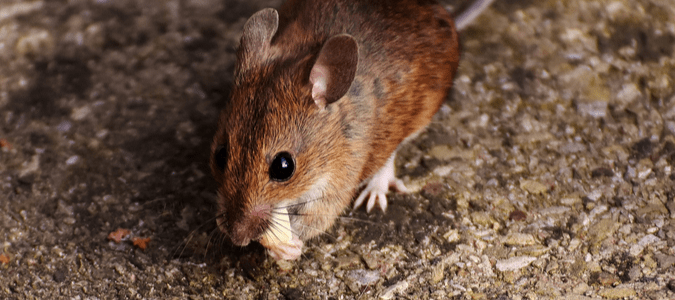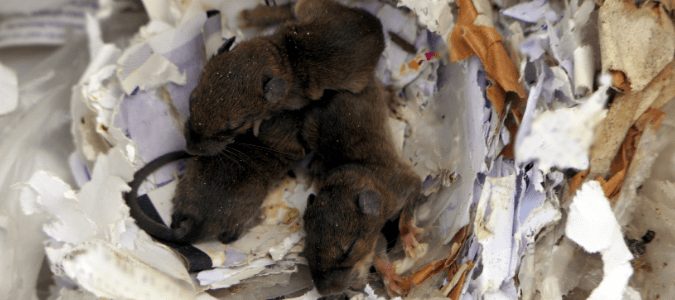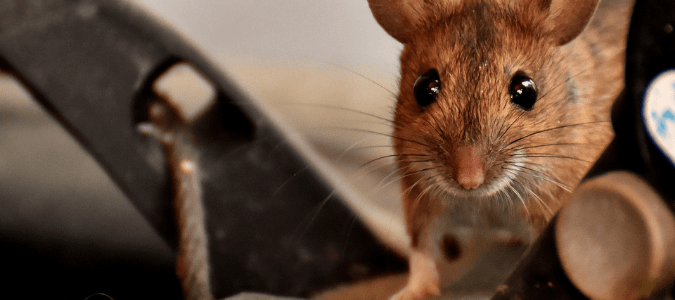Do Moth Balls Keep Mice Away?

Nowadays, mothballs are no longer recommended to control anything but moths. Manufacturers now use extremely toxic chemicals like naphthalene and paradichlorobenzene to make mothballs. These dangerous pesticides are useful when you keep them in a closed container with the clothes you are trying to protect. However, leaving mothballs out in the open as a way to repel rodents is a very bad idea.
Mothballs are ineffective as a rodent repellent. Plus, using them can expose your family to toxic chemicals. The way that mothballs work is that they kill moths and their eggs by releasing deadly gases into the air. When mothballs are in a sealed container, these fumes are contained. But when mothballs are out in the open, their toxic vapors can spread and cause serious harm.
Whenever you can smell mothballs, this means you are being exposed to their fumes. Exposure to toxic mothball gases can have significant impacts on your family and your pets. Some of the most common symptoms of exposure include vomiting, headaches, coughing, diarrhea, eye irritation and respiratory problems.
These dangerous chemicals can also leave you and your family with even more serious conditions. Exposure to mothball fumes can cause hemolytic anemia, kidney problems and liver damage. There is also evidence that some of the chemicals in mothballs could cause cancer. Additionally, when homeowners use mothballs outside, they can mistakenly contaminate water and soil. This is why it is vital to avoid using mothballs for rodent control.
Beyond mothballs, there are also several other home remedies that some people use to try to keep mice away. Here are some other home remedies Central Texans have tried in an attempt to control mice.
Ultrasonic Pest Repellers
These devices claim they keep mice away by sending out an ultrasonic wave. This is a sound at a frequency that humans cannot hear. The idea of ultrasonic devices plays on the fact that rodents can get spooked by strange noises. Unfortunately, they are ineffective at controlling mice for several reasons.
For one, the ultrasonic waves cannot go through walls and other objects. Additionally, they cannot travel very far from the device. Homeowners typically have to buy several of these devices to get any kind of results. In addition, even if the device seems to help some with rodent control, this effectiveness usually wears out over time. As rodents get used to the ultrasonic sound waves, the noise is less likely to scare them away.
Essential Oils
One common method is to spray herbal or natural oils around your home. The thought behind this approach is that mice will stay away because they do not like the smell of these oils. In fact, some studies have shown that using substances like pure peppermint oil can have some effectiveness as a rodent repellent.
You might be able to keep some mice away if you spray the oil in areas where mice are most likely to enter your house. Unfortunately, the effectiveness of this green tip is usually only temporary. These scents fade quickly, which means they only work for a short amount of time.
Used Kitty Litter
Spreading urine-soaked kitty litter is another common DIY trick for homeowners trying to repel mice. Similar to the method of using essential oils, some people claim that the smell of the used kitty litter will keep mice away. However, this method has not been proven to be effective.
Cats and Dogs
Many homeowners in Central Texas have pets and hope that having a cat or dog will keep mice away. It is true that many pets are good at catching and killing mice, so this can help you get rid of some mice. But even if you have a pet, it is important to use another form of rodent control as well.
Dogs and cats can sometimes help scare away mice for a little while. However, mice are smart and can adapt to their surroundings. Instead of completely abandoning a home with a pet, mice are more likely to change their behaviors within the house. For example, they can figure out what time of day it is safe to come out, such as when the dog typically naps.
Additionally, if your dog or cat catches a mouse or two, this is usually a sign that there are many more mice hiding in your house. Mice reproduce rapidly—sometimes having as many as 10 litters of babies each year. This means that there are probably many more mice in your house than your pet will be able to catch.
Mice can spread dangerous diseases like salmonella, so it is critical to get rid of them as quickly as possible. But it is also important to be sure that your rodent control method does not put your family at risk. Spending time and money on DIY rodent control approaches is often frustrating and costly. Most of these home remedies are not effective at scaring away mice. Plus, some of them might even create more problems for your family.
When it comes to rodent control, the best choice is to contact a professional. These specialists know the most effective and safest ways to keep mice away from your house, so you do not have to worry.

Do I Have a Mouse Nest in My House?
When mice invade a home, they typically leave behind a number of signs. For one, they often use household materials to build their nests. If there are mice in your home, then you might see shredded paper lying around or notice holes in a cardboard box.
However, mice will use nearly any materials they can find to build their nests. Some of the most common things they use include insulation, shredded cloth, packing materials, tissues, grass, cotton and other fibrous materials. They typically build these nests in dark, sheltered areas like attics and inside walls.
If you think you see signs of a mouse nest in your house, it is important to look for other signs of infestation as well. Some common things that could indicate you have mice in your home include:
- An unexplained musty odor
- Gnaw marks or bites in food packages, clothes, wiring, plastic or furniture
- Mouse droppings
- Crumbs or scraps of partially eaten food in your pantry or near your pet’s food bowl
- Strange sounds like scratching or bumping in your walls or attic
Mouse nests are usually a sign that a mouse is either about to give birth or recently had a lot of babies in your home. Mice can reproduce quickly, so a nest could indicate that your mouse problem is about to get much bigger. If you think you might have mice in your house, it is important to contact a rodent control professional as soon as possible. These specialists have the expert knowledge and tools to efficiently and effectively get rid of the pests in your home.

What Do Mouse Urine Stains Look Like?
If you see what looks like a water stain, then there is a chance it is actually mouse urine. Unfortunately, it can be hard to know for sure if that stain came from a mouse or something else. Oftentimes, mouse urine can only be spotted with a UV light. It is usually easiest to look for other nearby signs to figure out what left the stain.
You are most likely to find dried mouse urine near other common signs of infestation. For example, if the spot is actually a mouse urine stain, then you might also find mouse droppings or a mouse nest nearby. You might also see nesting materials, such as shredded paper, furniture stuffing or cardboard. Additionally, if there is a large urine stain, then it might smell bad.
It can be difficult to identify mouse urine stains. Plus, you could accidentally put yourself at risk if you try to inspect for these stains on your own. Rodent urine can carry dangerous diseases that could spread into the air. That is why it is best to leave this job to a professional. Rodent control specialists have the expert training and skills to take care of everything for you, so you do not have to deal with it.
Chem-free Can Control the Mice on Your Property
There are a number of reasons why you don’t want mice on your property. Chem-free can create a thorough pest treatment plan to get rid of these creatures. We can keep mice out of your bed and off your property. This way, you and your family members can feel at ease at home again.
Need Help Managing Pests?
Chem-Free offers both effective, low-impact pest control options and preventative measures to help avoid future infestations. Contact us today for a free estimate!


